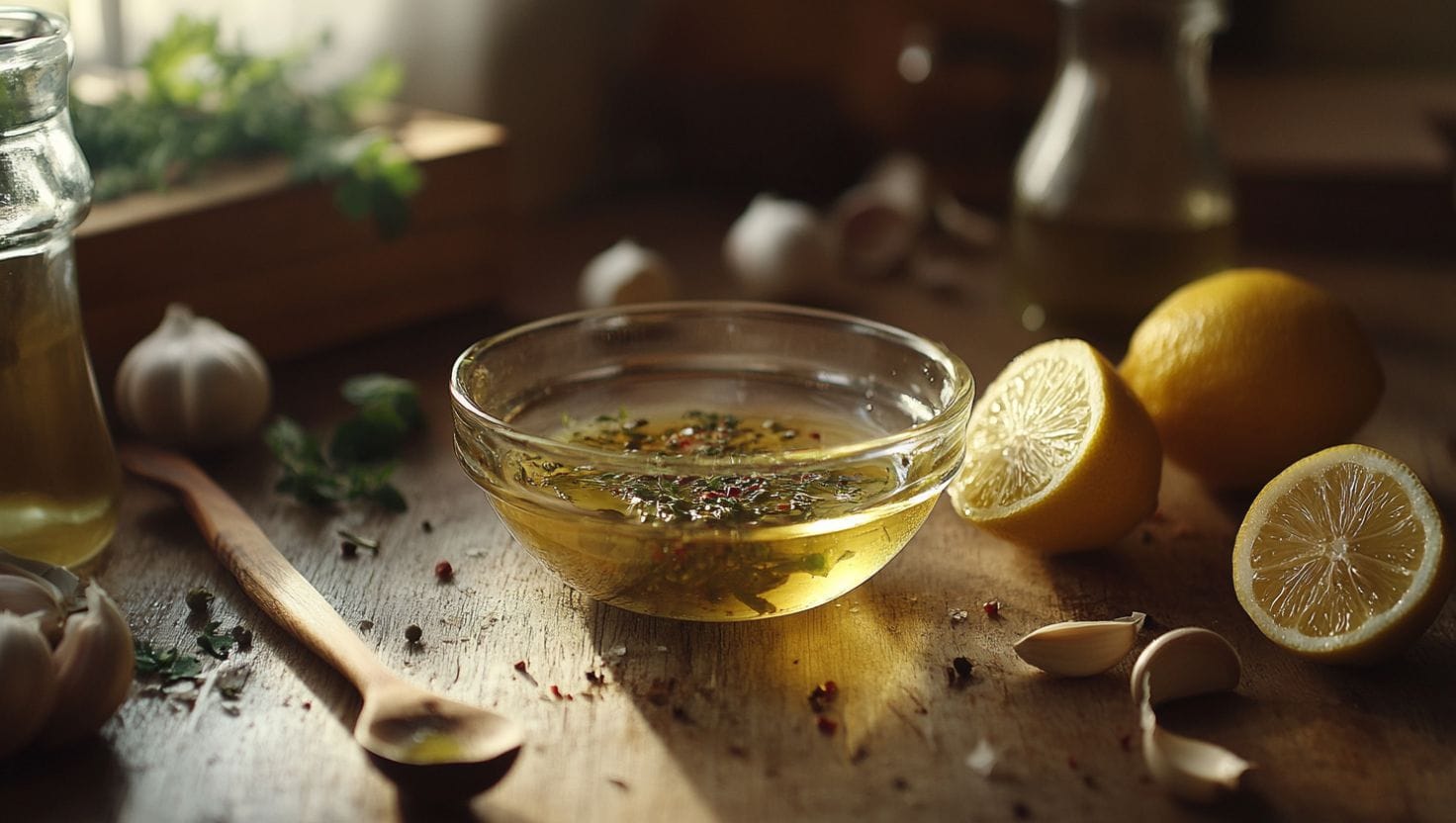Marinating is a culinary technique that transforms food by infusing it with flavor and improving its texture. But what are the 3 main ingredients when marinating, and why are they essential? A great marinade achieves more than just seasoning; it tenderizes the food, enhances moisture, and delivers complex, bold flavors. Understanding these three components—acid, oil, and seasoning—will help you elevate your cooking skills. These ingredients work synergistically to create mouthwatering dishes that delight the senses.
Whether you’re marinating chicken for a barbecue, vegetables for grilling, or seafood for a delicate dish, mastering the essentials ensures every bite is memorable. What are the 3 main ingredients when marinating? Acid, oil, and seasoning are the keys to success in any marinade recipe.
Key Takeaways
| Ingredient | Purpose | Examples |
|---|---|---|
| Acid | Breaks down proteins for tenderness | Vinegar, lemon juice, yogurt |
| Oil | Preserves moisture and carries flavor | Olive oil, sesame oil |
| Seasoning | Enhances flavor profiles and complexity | Herbs, spices, aromatics |
Understanding the Basics of Marinating
Why Knowing the 3 Main Ingredients When Marinating Matters
Marinating serves two primary purposes: to enhance the flavor of the food and to improve its texture. For example, acidic components in a marinade break down tough protein structures in meats, making them softer and more palatable. This is especially vital when preparing tougher cuts like flank steak or brisket. Moreover, marinating imparts a depth of flavor that simple seasoning cannot achieve on its own.
Beyond flavor and tenderness, marinating also helps retain moisture. This ensures that the food doesn’t dry out during cooking, a common challenge in grilling and roasting. Not only does this technique amplify taste, but it also creates a more enjoyable eating experience. Understanding what are the 3 main ingredients when marinating can help you achieve these results consistently.
What Are the 3 Main Ingredients When Marinating?

Marinades are built upon three foundational components: acid, oil, and seasoning. Each serves a distinct function:
- Acid: This component is vital for breaking down proteins, making food tender and flavorful. Acids like vinegar, lemon juice, and yogurt chemically alter the proteins, softening the texture while enhancing the absorption of flavors.
- Oil: Often overlooked, oil is the carrier of flavor and a protector against dryness. It ensures that the marinade penetrates deeply, locking in moisture and ensuring a rich, consistent taste throughout.
- Seasoning: The addition of herbs, spices, and other aromatics provides the necessary complexity. Seasonings complement the acid and oil, ensuring the marinade resonates with bold and intricate flavors.
When you know what are the 3 main ingredients when marinating, you can effortlessly create flavorful and tender dishes that impress.
What Are the 3 Main Ingredients When Marinating?
Acid: The Tenderizer in Marinades
Acids are essential for breaking down proteins in meats, which allows for tenderization. When you marinate chicken in lemon juice or steak in red wine, the acidic component initiates a chemical reaction, softening the fibers. This not only makes the meat easier to chew but also enhances the penetration of flavors. For a deep dive into how acids influence marinades, consider exploring acid’s effect on tenderizing meats.
Different acids pair well with various cuisines. For instance, rice vinegar is often used in Asian recipes, while buttermilk is a staple in Southern cooking. Knowing what are the 3 main ingredients when marinating helps you choose the right acid for your recipe and desired flavor profile.
Oil in Marinating: The Moisture Preserver
Oil is not just a flavor enhancer—it also plays a pivotal role in ensuring the food retains moisture during cooking. By forming a protective layer, oil prevents the marinade’s acids from drying out the surface of the food. This is particularly important for lean proteins like chicken breast or white fish, which can become dry if overexposed to heat.
Moreover, oil helps the marinade adhere to the food, ensuring that the seasoning and acid are evenly distributed. This results in a consistent flavor throughout the dish. To explore more about the role of oils in marinades, consider consulting guides like why oil is essential in marinades.
Seasoning: Enhancing the 3 Main Ingredients When Marinating
Seasoning is the soul of a marinade, and achieving the right balance is crucial. Salt plays an essential role by promoting osmosis, which helps the flavors penetrate the food deeply. Without salt, marinades would struggle to infuse their full range of flavors into the food. Similarly, spices like cumin, coriander, or paprika add layers of complexity and ensure the dish stands out.
To achieve a balanced seasoning profile, consider combining spices with complementary flavors. For instance, cumin pairs well with garlic for a bold marinade, while paprika and oregano create a smoky and herbaceous blend. Properly balancing these elements guarantees that your marinade enhances the natural flavors of the food rather than overwhelming them.
By incorporating acid, oil, and seasoning into your marinades, you unlock the full potential of your dishes. What are the 3 main ingredients when marinating? They are the secret to ensuring your dishes are tender, flavorful, and unforgettable. This trio is a must-know for any aspiring cook.
Customizing Marinades for Different Proteins
Marinades for Meats and Poultry

Creating the perfect marinade for meats and poultry involves balancing the 3 main ingredients when marinating: acid, oil, and seasoning. For red meats like beef or lamb, robust marinades with red wine, balsamic vinegar, or soy sauce are ideal. These acids work well with the proteins in the meat, breaking them down for tenderness. Add olive oil to carry the flavors and season with aromatic herbs like rosemary or thyme for an earthy depth.
For poultry, lighter acids like lemon juice or buttermilk help retain moisture while ensuring tenderness. Chicken pairs exceptionally well with marinades featuring garlic, parsley, and paprika. Not only do these seasonings add flavor, but they also create a vibrant appearance after grilling. To see how different combinations work, consider trying recipes like Mexican Chicken Marinade, which balances citrusy tang with bold spices.
Marinades for Seafood and Vegetables

Seafood and vegetables require a different approach, as they are more delicate compared to meats. Acids like lime juice or rice vinegar are commonly used in seafood marinades to add brightness without overpowering the dish. For example, a marinade with sesame oil, ginger, and soy sauce works wonderfully for shrimp or salmon. These ingredients not only highlight the natural flavors of the seafood but also prevent overcooking.
Vegetables benefit from shorter marination times, as they quickly absorb flavors. A mix of olive oil, balsamic vinegar, and Italian herbs like oregano and basil makes a fantastic base for grilled zucchini or bell peppers. Understanding what are the 3 main ingredients when marinating ensures you can adjust ratios to suit the specific needs of each ingredient.
The Science Behind Effective Marinating
Factors Affecting Marination Time
Marination times can vary widely based on the type of protein, the strength of the marinade, and the thickness of the food. For instance, tougher meats like brisket may require 12–24 hours to properly absorb the flavors and achieve tenderness. On the other hand, delicate seafood like shrimp only needs 15–30 minutes, as extended exposure to acid can break down the proteins excessively.
Thickness also plays a role. Thinner cuts of meat or fish fillets will marinate faster than larger roasts or whole chickens. Adjusting the time based on these factors prevents under or over-marinating, ensuring balanced flavor and texture.
How to Avoid Over-Marinating
Over-marinating is a common mistake that can lead to an unpleasant texture. Acids in the marinade, when left too long, can denature proteins excessively, resulting in mushy meat or seafood. To avoid this, follow these guidelines:
- Seafood: Marinate for 15–30 minutes.
- Chicken: 2–8 hours, depending on the cut.
- Beef and Lamb: Up to 24 hours for tougher cuts.
Additionally, always store marinated foods in the refrigerator to maintain safety and freshness. Keeping track of marination times not only ensures better results but also highlights why mastering what are the 3 main ingredients when marinating is key to avoiding such pitfalls.
Common Mistakes When Marinating
Overpowering Flavors with Imbalanced Ingredients
An imbalanced marinade can overpower the natural flavors of the food. For example, using too much acid without enough oil can result in overly tangy and dry dishes. Similarly, an excess of seasoning might mask the taste of the main ingredient. To achieve harmony, maintain a balanced ratio, such as:
- Acid: 1 part
- Oil: 2 parts
- Seasoning: Adjust to taste
By keeping this ratio in mind, you ensure each component works together seamlessly.
Improper Use of the 3 Main Ingredients When Marinating
Improper techniques can ruin even the best marinades. Avoid these common mistakes:
- Reusing Marinades: Marinades that have been in contact with raw meat should not be reused unless boiled thoroughly to eliminate bacteria.
- Inadequate Coverage: Ensure the food is fully submerged or evenly coated to guarantee consistent flavor.
Storing food in a sealed container or resealable bag also prevents cross-contamination. Taking these precautions not only improves the quality of your dish but also ensures food safety.
By mastering these techniques and understanding what are the 3 main ingredients when marinating, you can avoid common pitfalls and create dishes that are flavorful, tender, and unforgettable.
FAQs About What Are the 3 Main Ingredients When Marinating
What are the 3 main ingredients when marinating, and why are they essential?
The three main ingredients in a marinade are acid, oil, and seasoning. Each plays a vital role:
- Acid breaks down proteins to tenderize and enhance absorption of flavors.
- Oil ensures moisture retention and carries the flavors deep into the food.
- Seasoning adds complexity and depth, bringing out the best in the dish.
Understanding these components ensures your marinades are both effective and flavorful.
How long should different proteins be marinated?
Marination times vary by protein type. Here are general guidelines:
- Seafood: 15–30 minutes
- Chicken: 2–8 hours
- Beef and Lamb: 4–24 hours, depending on the cut
Delicate proteins like fish require less time to avoid over-marinating, while tougher meats benefit from longer exposure to the marinade.
Can marinades be reused safely?
Reusing marinades can pose a risk of cross-contamination due to bacteria from raw meat. To reuse, boil the marinade thoroughly for at least five minutes to kill any harmful microorganisms. Alternatively, reserve a portion of the marinade before adding raw ingredients for basting or dipping.
What is the ideal ratio of acid, oil, and seasoning in a marinade?
A balanced ratio ensures the best results. The general rule of thumb is:
- 1 part acid
- 2 parts oil
- Seasoning to taste
This balance prevents the acid from overpowering the food while allowing the oil and seasonings to work effectively.
Are there any proteins that should not be marinated?
While most proteins benefit from marination, some are exceptions:
- Delicate fish like cod or sole may fall apart with extended marination due to their tender structure.
- Pre-brined or highly processed meats, such as cured hams, may not require additional marination as they are already flavorful.
Knowing when and how to marinate is just as important as understanding what are the 3 main ingredients when marinating.
Final Thoughts on What Are the 3 Main Ingredients When Marinating
Acid, oil, and seasoning are the foundational elements of any successful marinade. By understanding their roles and mastering their balance, you can transform simple ingredients into flavorful, tender, and aromatic dishes. Moreover, marinating is a versatile technique that allows endless creativity, from Mediterranean herb blends to Asian-inspired ginger and soy mixtures.
Experimenting with different combinations of the 3 main ingredients when marinating empowers you to craft dishes that reflect your personal taste and culinary style. Whether you’re grilling, roasting, or stir-frying, a well-made marinade elevates the final result, ensuring every bite is a celebration of flavor. So, dive into the world of marinades and unlock the secret to unforgettable meals.

